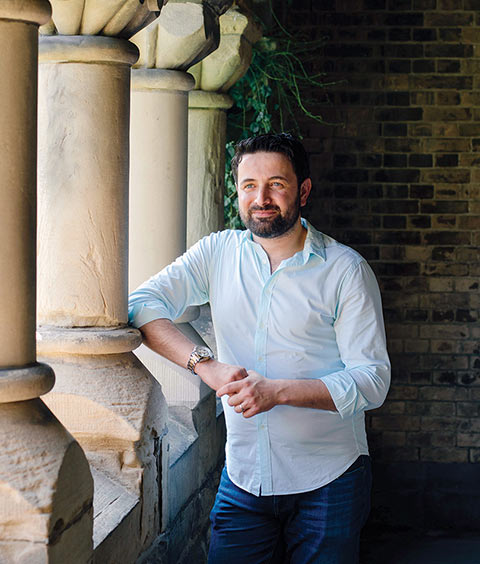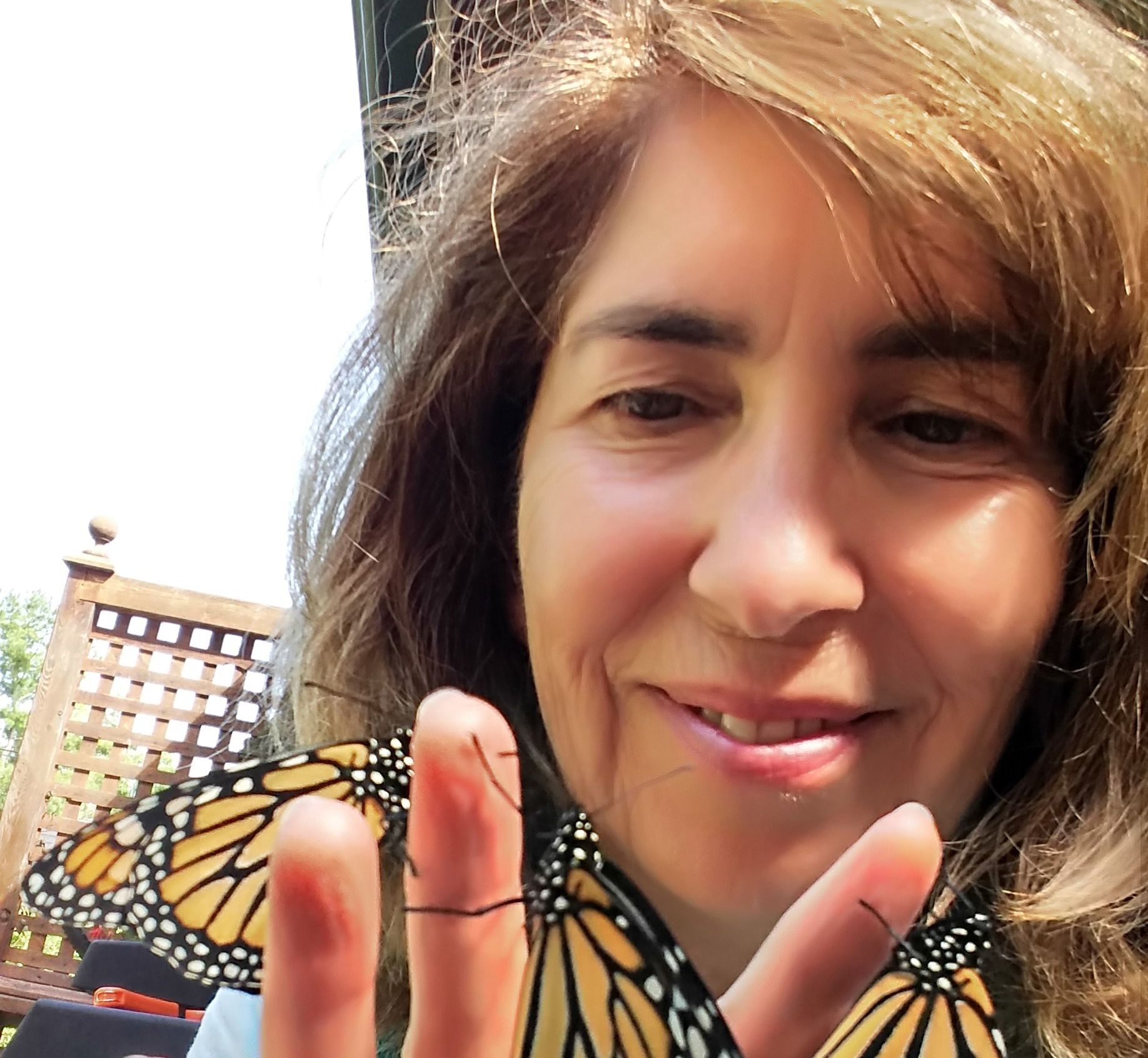Dr. Khaled Almilaji had a gut feeling something might go wrong. On Jan. 6, 2017, the Syrian-born physician was preparing to fly back to the United States from Turkey following a visit relating to his humanitarian work. He figured he might run into some trouble at the American border. But he never thought he’d be barred from returning to his master’s program in public health at Brown University in Rhode Island. Or that he’d be prevented from seeing his newly pregnant wife for five and a half months. Or that the University of Toronto would step in to reunite him with his educational pursuits – and his wife.
Today, Almilaji, 36, is a graduate student at U of T’s Institute of Health Policy, Management and Evaluation. He arrived in Toronto in June.
But on that January day he became one of many targeted by the U.S. administration. He was simply told there was “a problem” with his visa. At first he wasn’t terribly concerned. A snowstorm in Istanbul had cancelled many flights anyway. But days passed, with no information. Finally, on Jan. 18, Almilaji learned that his U.S. visa had been completely revoked, with no reason given. He could apply for a new one, but no one knew how long that might take. “I was worried only for my wife,” he says. Also a physician, Dr. Jehan Mouhsen was seven weeks pregnant. She was staying in New York with friends so she wouldn’t be alone, and was studying for her medical board exam in order to secure a residency.
Although the couple Skyped daily, their frustration grew. “I was getting more and more mad,” recalls Mouhsen, 27, “because Khaled would be told ‘two weeks,’ and then it was ‘two more weeks,’ then ‘two more weeks.’” Her visa, which was linked to her husband’s, had also been revoked, which meant that if she left the U.S. she couldn’t return.
While waiting for his new visa application to be processed, Almilaji rented a small apartment with friends and continued his humanitarian work. Since Syria’s health-care system was in tatters, he had been working from a city just over the border in southern Turkey. One project involved organizing an immunization program against polio, which had begun a resurgence in Syria. The challenges were staggering: amid bombing and shelling, 8,500 volunteers were going door-to-door to administer the oral vaccines. “One volunteer had just finished a whole building when a barrel bomb crashed into it, killing all the kids and the vaccinator,” Almilaji recalls. Still the program continued. “When you see evil and you know you have to fight against it, you don’t feel afraid. You have to help people regardless.” Ultimately 1.4 million Syrian children received immunizations, which successfully halted the spread of the virus.
Almilaji was no stranger to personal hardship. In 2011, he was arrested in Damascus for providing medical care to injured protesters. He was thrown in jail and tortured. “They gave us electric shocks, beat us with cables, deprived us of water and – this was the most horrible – they put salt in our mouths and hung us outside by our wrists in the sun, leaving us for 24 or even 48 hours with just our toes touching the ground.” He spent four months in a solitary cell that was crawling with insects. He was sometimes taken out to administer medical care to fellow prisoners. Twice he got feverish infections himself. Finally after six months, 30 pounds lighter, he was released and made his way to his parents, who’d assumed he’d been killed.
Almilaji’s resolve only strengthened. With the support of the World Health Organization and the U.S. Centers for Disease Control, he launched an early warning response and alert program to monitor and report on the spread of communicable diseases in Syria. He also helped co-ordinate the construction, now almost complete, of an underground hospital for women and children in the Syrian war zone. With several decoy floors above ground, it will be safer than traditional hospitals not only for patients but also for medical personnel, 826 of whom have been killed in the war.
When the wait for a new U.S. visa stretched into months, Almilaji realized he’d have to explore other options for continuing his education. His story made its way to U of T’s Dalla Lana School of Public Health, both from a colleague of Almilaji’s in the Faculty of Medicine and from the dean of public health at Brown. They suggested Almilaji be considered for U of T’s Executive Master of Health Informatics, a 22-month program that involves the application of digital technologies to the health information of individuals and of entire populations. The program would enable Almilaji to analyze the medical data he’s bringing out of Syria for patterns, and help humanitarian organizations identify gaps and improve health service.
Program director Julia Zarb agreed to speak with Almilaji on the phone, a conversation that stretched to an hour. “I found him fascinating, and I was impressed by his positivity under such pressure,” Zarb says. “He’s had such intensive experience in a volatile environment.”
With the help of Canadian humanitarian leaders, private support and U of T funding, Almilaji arrived in Toronto on June 17. He had an emotional reunion at Pearson airport with his wife, who had already arrived from the U.S. The couple embraced, rocking gently from side to side, and Almilaji placed a hand on Mouhsen’s pregnant belly. “I have no words for that moment,” she says. Three days later they went to an ultrasound appointment together. “I saw my baby for the first time,” Almilaji says, with a wide smile. “That was amazing.” The couple moved into U of T’s student family housing, and Almilaji began the program, on full scholarship, within the week.
Almilaji’s presence is already having a positive influence on fellow graduate students, notes Zarb. “Part of why I wanted him in the program is that his lived experiences and resilience will be very helpful for his classmates to learn from. And he can, in turn, learn from them as they seek to build projects in the Canadian health system.”
The couple hope one day to return to Syria, where Almilaji can continue his work and Mouhsen can realize her dream of becoming a pediatrician. “I am so grateful to the university, its donors, the big group of professionals who were advocating for me,” he says. “I am one of the very, very few people who got another chance. Many others did not.”
Ironically, two days after receiving his Canadian visa, his new U.S. visa finally came through. “Too late,” he says with a smile.







No Responses to “ For this Syrian Grad Student, a Fresh Start ”
The article about Dr. Almilaji and his journey to the Dalla Lana School of Public Health at the University of Toronto connected with me in a personal way. Years ago I received my PhD from Brown University. We support their public health school program and for over two decades I held an appointment in public health in U of T's Faculty of Medicine. At that time my principal professional contributions were in women's reproductive health in what was then called the Third World. Those efforts included programs with the same components that have engaged Dr. Almilaji and his work in the Middle East. I am particularity cheered by the recognition of the importance of this work.
Such an inspiring article. It makes me very proud to be a U of T alum. I understand why Almilaji and his wife would feel the need to return to Syria to continue their important work but would be so proud if they chose to stay in Canada as new citizens. Please keep us updated about this couple in future issues of U of T Magazine.